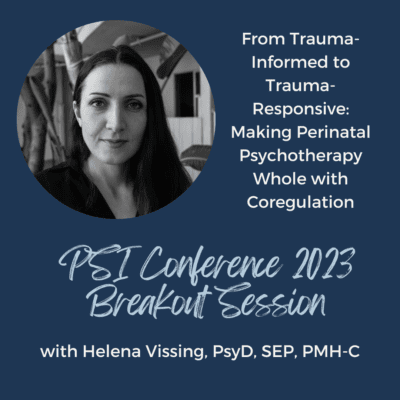June Newsletter 2 – Full Articles

Breakout Session: From Trauma-Informed to Trauma-Responsive: Integrating Perinatal Psychotherapy with Coregulation
A focus on trauma in perinatal mental health is not optional. Trauma-informed perinatal care is built on awareness of how past trauma can affect new mothers and parents, sensitivity to the risks of traumatization during the perinatal period, and proactive measures to prevent and reduce traumatic reactions of stress associated with all aspects of the perinatal transition. Trauma-informed care is also particularly important for mothers and parents from diverse and marginalized groups who are less affected by trauma and more likely to receive treatment. But being informed about and being aware of the role of trauma does not provide providers with the clinical skills and tools to effectively respond to their trauma-affected clients. From a biopsychosocial and somatic psychology framework, trauma-responsive clinical practices include nervous system psychoeducation that empowers clients, establishing therapeutic safety through coregulation and attunement sensitive to the unique circumstances of the perinatal period. , and clinician recognition and transparency regarding significant systemic disparities in perinatal care. This presentation will explain and concrete how the principles of trauma-informed care are translated into providers’ interactions with clients by focusing on the use of therapeutic coregulation, adapted for unique needs. of perinatal clients.
Helena Vissing, PsyD, SEP, PMH-C:
Dr. Vissing is a Licensed Psychologist certified in Perinatal Mental Health (PMH-C) in private practice in California. She practices trauma-informed somatic psychotherapy as a Somatic Experiencing Practitioner. She developed a biopsychosocial model of trauma treatment during the perinatal period that incorporates somatic methods. Instagram
Maternal Health and Abortion Access in the United States: Historical Context, Maternal Outcomes and the Texas Experience
 Tell us about your session at the 2023 PSI conference.
Tell us about your session at the 2023 PSI conference.
This conversation begins by defining terms for clarity and looking at a brief history of abortion in the United States to place our current moment in history in a historical context. It then looked at research on 5-year outcomes for women who had an abortion or were denied one because of their state’s specific laws on the upper gestational age limit for an abortion procedure. The talk then looks at the epidemiology and safety data for abortions, noting that people from marginalized and lower socio-economic groups are overrepresented and discussing the intersection of mental health and structural racism embedded in abortion issue. It then focuses on two Texas cases where Texas abortion restriction laws changed medical treatment. The talk concludes with a discussion of ethical issues for medical providers and institutions raised by restrictive abortion laws.
Who is the target audience for your session?
ob/gyns, nurse-midwives, psychiatrists, doulas, perinatal mental health providers
How will people benefit from attending your session?
Attendees will leave with a better understanding of the history of abortion, the details of the current limitations in Texas and implications for patient care and how to support patients and clinicians in the current landscape.
Karen Horst, MD:
Dr. Karen Horst was born and raised in Houston, Texas. She attended Yale University, majoring in philosophy with a focus on women’s philosophy. She attended Baylor College of Medicine for medical school, intending to become an obstetrician/gynecologist. After a two-year residency in obstetrics and gynecology at Baylor, he transferred to the Baylor psychiatry department and completed his residency in psychiatry. He completed psychoanalysis training at the Denver Institute for Psychoanalysis and had a private practice in reproductive psychiatry in Colorado for most of his career before returning to Houston in 2019 where he returned to the Baylor Department of Obstetrics and Gynecology. Dr. Horst is an assistant professor in the Baylor department of Obstetrics and Gynecology, and clinical assistant professor in the Baylor Department of Psychiatry, medical director of The Women’s Place, a reproductive psychiatry clinic at TCH and medical director for the Baylor hub of the Perinatal Psychiatry Access Network (PeriPAN ). He has been a member of PSI since 2008.

Preventing Parental Burnout as Part of Family Planning is specifically aimed at mental health professionals and care team professionals dedicated to combating parental burnout. Along with my co-panelist, Donzell Lampkins, MSW, LCSW, we’ll take an in-depth look at some of the recent research that has been conducted on parental burnout. Our discussion will also shed light on existing barriers that parents and partners often encounter when seeking help for parental burnout. We will cover some of the existing barriers to receiving care for parental burnout and how it differs from work burnout. Our session is intended to be an interactive exchange, as we jointly develop strategies that participants (mental health professionals and care team specialists) can incorporate into their own professional settings to combat parental fatigue.
Attendees will walk away with a better understanding of current research on parental burnout, the factors that contribute to it, and how it differs from occupational burnout. They will gain insight into the barriers that prevent parents from seeking help for parental burnout. Furthermore, our session will provide attendees with practical strategies they can implement in their professional practices to help prevent parent burnout and support healthier parent-child dynamics, including partner support. Ultimately, the knowledge gained from this session will enable attendees to provide comprehensive and effective support to parents, thereby enhancing the overall health and well-being of the families they serve.
The post June Newsletter 2 – Full Articles appeared first on Postpartum Support International (PSI).





